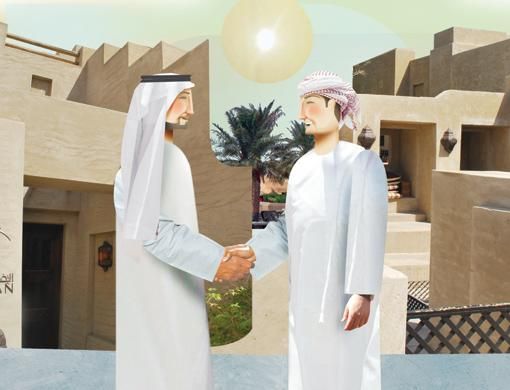Dubai: Around the world, cultural traditions and ways of life are handed down. Emiratis across the country and around the world are proud of and cherish their heritage even today, and endeavour to maintain their traditions even in the face of tremendous change and the rapid development of recent decades.
In the UAE, many of those traditions reflect the people's historical reputation for generosity, courtesy and love of community. Emirati households, for example, ensure the majlis (reception area) is kept tidy and prepared at all times to receive guests at any hour. It is also perfumed with incense of Oud to welcome guests, who are invited to sit in places of honour within the room. These relatively small gestures speak volumes about the hospitality of the hosts, and the genuine warmth towards for visitors.
The conversation patterns of social visits are always respectful. Asking after members of the community reflects a genuine interest in their well-being and progress and reinforces the kinship in the larger community.
Coffee is another significant element of the social visit. The Arabic coffee served to guests is made even more special with the addition of ingredients including cardamom, saffron and sometimes even rose water, all indicators of generosity and hospitality. The coffee ritual can also be expanded with the offering of food. Al Fuwala for example, includes the serving of crackers, fruit and sweets. A second serving of coffee follows before dinner.
For dinner, the head of the household will often choose to honour his guests by slaughtering a goat, dairy animal or small camel. The meat is cooked on the bone, simmered with rice and a mixture of spices. The cooked head of the animal is placed on the top of the food to signify a certain courtesy towards the guests. Neighbours are invited to share the feast, to show the appreciation of the host towards their guest.
At the end of the visit, the members of the household will share incense with their guests, with special Oud used to perfume the female guests.
In the past neighbours saw themselves as one family, where characteristics such as brotherhood, friendship, compassion, and cooperation were seen and felt in the community. People living in the same "freej" or neighbourhood, knew everything about each other.
For instance if a family was celebrating a happy occasion, such as a wedding, the whole neighbourhood would celebrate this family's happiness and give them their blessings. Likewise, if one of the families were distressed the whole neighbourhood came together to alleviate their pain.











